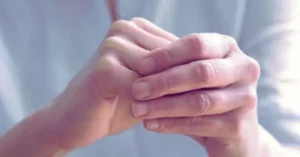Cold sores: What you need to know
Your first clue that a cold sore is on its way? That mild tingle, itch or burning sensation near your mouth. And when that familiar feeling settles in, it can create a lot of anxiety and make you want to stay home and cancel your social plans. After all, cold sores aren’t the accessory you want to get noticed for when you’re at the office or out for the evening. Plus, cold sores hurt and can take a couple weeks to heal on their own. The good news is that you have options. There are ways to manage uncomfortable symptoms at home and medications that can be taken at the first tingle or itch to stop or shorten a cold sore outbreak. Let’s learn more.
Cold sores are caused by a virus
Cold sores are caused by the herpes simplex virus type 1 (HSV-1). They typically spread through direct contact like kissing or touching affected body parts, and can also be transmitted through sharing things like beverages, utensils or lip gloss.
There’s no cure for HSV-1 – once you’re exposed, it’s always in your body. But it won’t always be active. HSV-1 and the cold sores it produces tend to be triggered and flare when you’re overly tired, feeling stressed, experiencing hormonal shifts or if you spend too much time in the sun.
You can take steps to prevent the spread of cold sores
The National Institutes of Health estimates that 90% of U.S. adults have been exposed to HSV-1 by age 50, but not everyone will experience symptoms or develop cold sores. If you do get cold sores, it’s important to take steps to prevent spreading the HSV-1 virus when blisters are present and active.
Prone to cold sores? Stop the spread with these tips
- Tune in – A person with HSV-1 is most contagious from the first slight tingle and burn. If you’re prone to cold sores, listen to your body for cues on when an impending outbreak is coming and take the necessary precautions to avoid spreading the virus to others.
- Don’t share – When experiencing an outbreak, avoid sharing things like drinking glasses, food and kisses with others.
- Hands off – Not only can you pass along a cold sore-causing virus to others, you can also spread the HSV-1 virus to other parts of your body if you touch an open sore and then another part of your body.
- Wash up – Frequently washing your hands when you’re experiencing an outbreak is the best way to avoid passing HSV-1 along.
- Take meds – At the first inkling of an outbreak, taking a prescription antiviral medication can help reduce the severity and duration.
Ways to feel better while you heal
From the first tingle and burn to when the scab finally recedes and new pinkish skin emerges, the lifecycle of a cold sore can last up to two weeks. Thankfully, there are things you can do at home to address common cold sore symptoms and feel better while you heal.
4 at-home cold sore management tips
- Tame pain – Take acetaminophen or ibuprofen to calm cold sore pain.
- Moisturize – Keep lips and the skin around your mouth supple and crack-free with petroleum jelly.
- Cool down – Calm inflammation by applying a cold compress or ice to the affected area.
- Try an OTC topical – Use an over-the-counter medication like Abreva cream to speed healing.
Online treatment for cold sores
You don’t need to put up with cold sores and the physical discomfort and disruptions they can cause. At Virtuwell, we’ll assess your symptoms and tailor a treatment plan that addresses your health needs. Often, that includes a prescription antiviral medication that, when taken within 72 hours of an outbreak, can help prevent or greatly shorten the duration of a cold sore.
Share this post
Do you know someone who could use a simple & affordable healthcare option?

